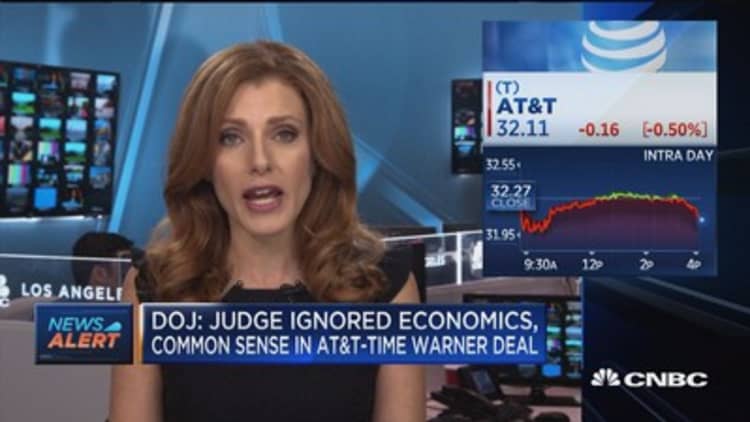The U.S. Department of Justice released its written argument explaining why it's appealing AT&T's $85 billion acquisition of Time Warner, a deal that was approved by U.S. District Court Judge Richard Leon in June.
The government argues Judge Leon ignored "mainstream economics" in his decision because he refused to see a deal as having "an appreciable danger" of raising prices on consumers in the future.
The government said Judge Leon ignored economic theory by claiming Time Warner wouldn't have increased bargaining power over pay-TV distributors by linking up with AT&T. This was one of the DOJ's primary arguments during the initial case to the District Court -- that AT&T could charge companies such as Comcast, Charter and Dish more money for Time Warner with the fallback of blacking out networks such as CNN, TNT and TBS and offering them on DirecTV, which AT&T owns. If pay-TV operators refused to pay more, customers could switch their service to DirecTV, setting up a "win-win" for AT&T.
AT&T successfully defended against this charge, arguing that the economics behind buying Time Warner only made sense if the company made programming available to as many people as possible.

"The district court's determination that Time Warner would not have increased bargaining leverage post-merger erroneously disregarded the economics that governs negotiations in this industry," the DOJ argued in its brief. "Defendants' FCC filings acknowledged that the vertical integration of a high-value programmer with a large distributor in the MVPD industry leads to higher fees for rival distributors."
The DOJ also argued Judge Leon accepted an argument that DirecTV customers will receive lower prices because Time Warner wouldn't raise prices as aggressively to its own corporate parent because the firm, as a whole, would want to maximize corporate profits. The government said Judge Leon dismissed this argument as "implausible" when used in a different context pertaining to rival pay-TV firms.
Further, the government said Judge Leon dismissed the concerns of rivals because they are competitors of DirecTV rather than taking them on face value.
The district court "gave no consideration to the fact that these distributors had a direct and immediate stake as customers in the negotiations with Time Warner," the government argued.
AT&T General Counsel David McAtee responded by criticizing the appeal as a desperate plea to re-do Judge Leon's decision.
"Appeals aren't 'do-overs," McAtee said in a statement. "After a long trial, Judge Leon weighed the evidence and rendered a comprehensive 172-page decision that systematically exposed each of the many holes in the Government's case. There is nothing in DOJ's brief today that should disturb that decision."


